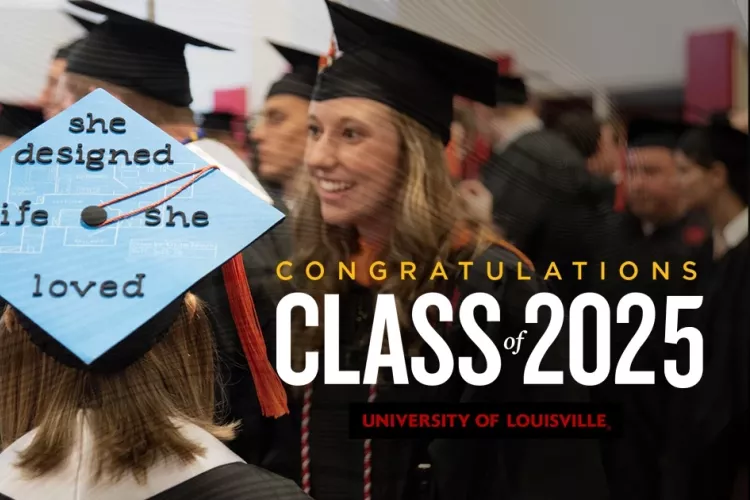UofL begins maple syrup harvest using campus trees
October 2, 2024Cardinals may have recently noticed buckets appear near trees across campus – all part of UofL Sustainability’s effort to harvest local maple syrup.
Earlier in February, community partner and UofL neighbor, Dave Barker led participants through a maple tapping workshop, installing taps on several trees in the center of campus. Barker instructed participants on the best practices for tree tapping without causing harm to the trees. He explained that sap flows are much more accessible to tap after temperatures swing from below freezing at night to above freezing during the day, creating an internal pressure that carries sap through the tree. After these conditions are met, sap may be seen leaking through natural scars. The only equipment then needed to harvest sap is a drill to make a one-inch hole, a tap to hammer in, tubing and a covered bucket. Once the sap is harvested, it’s then boiled down to remove the water and create syrup.
Justin Mog, assistant to the provost for sustainability initiatives says tree tapping is a sustainable way to create local maple syrup and sugary products while cutting personal emissions. Combining maple tapping with other gardening and farming practices can make an important impact in reducing individual environmental impacts.
“I think the most important thing we get out of this project is a better understanding of sustainability, which is all about tapping into the local resources right under our noses that we tend to ignore,” Mog said. “As we learned at the start of the COVID-19 pandemic, what makes modern life so precarious and unsustainable is an over-reliance on extractive economies that pull in resources from all over the place. Rather than spending a bunch of money and burning a bunch of fossil fuels to ship in syrup from Vermont, I’d much rather see us make our own and reconnect with the abundance that nature provides for us right here in Louisville.”
To make a gallon of maple syrup about 30–60 gallons of sap is needed. Assuming weather conditions support the flow of sap, UofL Sustainability hopes to produce a few gallons of syrup from Belknap campus trees. While the workshop focused on tapping maple trees, several other tree species can be tapped for sap to make syrup. Birch, hickory, sycamore and other types of trees can be used to create unique syrups with different flavor profiles from maple syrup.
The annual maple tapping workshop is part of UofL’s Sustainability Garden Commons workshops. The Garden Commons is a collectively managed space open to all students, staff, faculty and community members. Participants who assist in the garden’s projects are welcome to share in the harvest and take their share of organic produce.
The Garden Commons hosts several workshops and events to get volunteers engaged in recognizing the accessible abundance of gardening and foraging. Upcoming events include workshops on orchard care, berry foraging and community gardening in abandoned urban spaces. Garden Commons intern and UofL student Savannah Dowell organized this year’s maple tapping workshop.
“I want everyone who participates in the Garden Commons to walk away with the understanding and confidence that they, too, can grow, forage or learn anything their heart desires. The world of sustainable urban agriculture can be overwhelming, but don’t become debilitated by the plethora of possibilities,” Dowell said. “Whether you start with a mass-scale maple tapping project or a windowsill herb garden - just start!”
Over the coming weeks, Cardinals can help empty sap buckets into collection barrels at the North Information Center and behind Gottschalk Hall by signing up to volunteer.
Taste UofL’s maple syrup and honey at this year’s UofL Maple Syrup & Honey Pancake Party on Friday, April 19, from noon - 1 p.m. at the Cultural & Equity Center 176 (Belknap Village North).
View pictures on Flickr from the maple tapping workshop.



